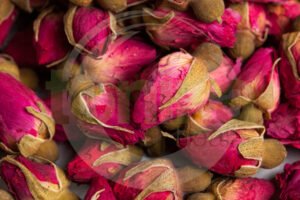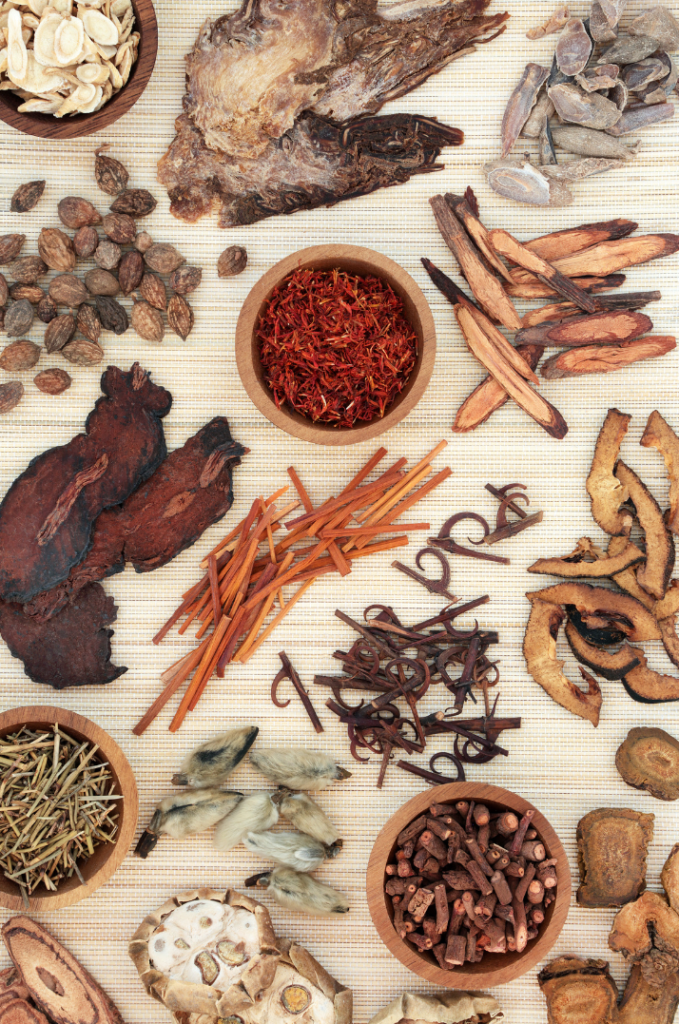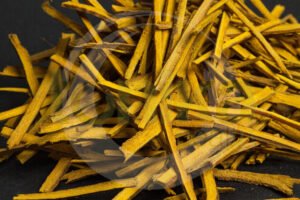






Chinese Herbal Medicine in Sydney
Peter and Veronika are highly qualified practitioners of acupuncture and Chinese medicine in Sydney. They are available for in-clinic Chinese herbal medicine and acupuncture sessions, you can book an appointment here.
Please note that Chinese herbal medicine prescription is included as part of your acupuncture session. However, Chinese herbal medicine products and other supplements are at an additional cost to the appointment fee.
Thinking about Chinese Herbal Medicine in Sydney?
Chinese herbal medicine is a major branch of Chinese medicine and is documented to have commenced several thousands of years ago, with its most famous period occurring in the late Han Dynasty prior to 220 CE, however it has been in constant development over many centuries up until its modern usage today. Chinese herbal medicine is still a commonly utilised healing method in China, where it is also used as an adjunct therapy to Western pharmaceutical medicines. In the last century, Chinese herbal medicine has spread across the globe, making it, alongside acupuncture, one of the most utilised forms of complementary and alternative medicine worldwide, with a long history of safe and effective usage.
Chinese herbal medicine prescription is rooted in the theoretical frameworks of Chinese Medicine, which means that it is based on Yin and Yang, the 5 Elements, the 4 methods, the 8 principles, the 6 Divisions, the theory of Qi, Blood and Fluids, and more. All these systems that are part of Chinese medicine have fundamental principles which guide the herbalist in the direction of treatment for their patient, which is very specific to the patient’s unique needs and requirements. There are also several schools of thought in Chinese herbal medicine which may influence how their practitioners prescribe formulas. These schools of thought may be focused on ancient texts, they may follow classical lineages or certain masters or doctors, they may adhere to certain ways of prescribing, and some are systems that include focus on specific diagnostics, such as specialised methods of pulse diagnosis, or other methods that focus on abdominal palpation such as Kampo (a Japanese interpretation of Classical Chinese Herbal Medicine). This basically means that several Chinese herbal medicine practitioners may have different modus operandi in coming to their conclusions in finding the right formulas for their patients.
A Chinese herbalist will take many aspects into account when deciding on the best herbal remedy to restore balance of the body and mind. Chinese herbal medicine can be used on its own or in conjunction with acupuncture and other Chinese medicine practices.
Our acupuncturists, Peter and Veronika, are registered practitioners of Chinese medicine and acupuncture in Sydney.
The Chinese Herbal Medicine consultation process:
Chinese herbal medicine, like other branches of Chinese medicine, takes a holistic approach to optimal health. While practitioners may focus on particular signs and symptoms associated with your condition, they will thoroughly assess you to determine your overall health and internal condition, and make a constitutional diagnosis based on the principles of Chinese medicine. As part of this diagnosis, the practitioner may ask you about your family’s medical history, your diet, appetite, exercise regime, lifestyle, sleeping patterns, emotional health, menstrual health if applicable, and ask about any medications or supplements you may be taking. They will talk to you about your general health, and any potential issues you’re seeking to remedy. They may also examine your pulse, and tongue, palpate your abdomen, and assess other areas of your body that are related to your presenting condition.
Once your assessment is complete, your Chinese herbal medicine practitioner will make a diagnosis, and design an individualised treatment plan for you. They will then prescribe a herbal formula (or several formulas) which are a specific combination of herbs that work synergistically based on Chinese herbal combination principles to influence your unique health condition, and that will be focused on restoring balance in your health. Your practitioner will prioritise primary concerns and offer long-term solutions for and constitutional or environmental imbalances that may be affecting your recovery.
Chinese herbalists may also be trained in other areas of Chinese Medicine, and so may recommend therapies such as acupuncture, massage, cupping, moxibustion, infrared heat
therapy, and more. You may also be given lifestyle and/or dietary advice, therapeutic or corrective exercises, breathing practices and/or meditation techniques.
Remember that Peter and Veronika offer free 15-minute phone appointments to discuss whether acupuncture and Chinese herbal medicine could help you. You can book your appointment here.
What about Chinese Herbal Medicine products?
After working out which formula you need to take, the all-important thing is the herbs!
In ancient times, Chinese herbal preparations started with raw herb decoctions (liquid extractions through boiling, taken internally or used for soaking the body in), taking herbs fresh or raw, cooking them and eating them, or drying them and grinding them into powder then taking as a draft, or fashioning them into balls/pearls (like pills) with honey and other binding agents. Other methods included extraction into alcohol for medicinal wines or liniments, extraction into oils for external application massage oils, grinding and mixing with other substances to form into a paste or poultice to apply onto the body, or boiling and steaming them to inhale the aroma. Specialised methods involved applying heat to the body combined with herbal agents- such as the application of warm herbal compresses or body steaming with herbal steam baths, bathing in herbal extractions, or burning and smouldering of certain herbs close to the skin- all methods which heat the body directly combined with the effect of the herbal constituents. All these methods have been used for thousands of years and are still in use, but the most common form of herbal therapy today involves oral administration of Chinese herbs. Importantly, the unique combination or classical herbal combination/formula that is prescribed is what is the key to creating powerful clinical results and is based on tried and tested Chinese herbal principles used over long spans of time. Over thousands of years the most effective Chinese herbal formulas have been identified and collated for their usage in different conditions. These ancient formulas are still in use today, whilst many new formulas
are continually being developed into the modern era, but still maintain the connection to the methods of the past.
What has rapidly improved in the last century is the science of herbal preparations and extractions, making it a highly refined process, leading to some very potent, reliable and reproducible herbal products that have excellent levels of safety and efficacy. All reputable Chinese herbal manufacturing companies go through rigorous processes to ensure that their herbal products have been species identified correctly, are free of pesticides, heavy metals, contaminants, yeast and mould, fungus and bacteria. They are tested for potency and presence of active ingredients, and if in formulations, it is ensured that they are combined in the correct ratios. The latest technologies of extraction processes and storage solutions ensure that when we receive a herbal product, and prescribe it to its end user, that the product does what it is supposed to do therapeutically for our patients.
At tonika health, we ensure that we only prescribe the best quality herbal products from reputable suppliers, as the safety of our clients is of utmost importance.
Our Chinese Medicine Practitioners:
Peter and Veronika, our registered Chinese medicine practitioners, have studied Chinese herbal medicine as part of their degree training at university level and have extensive experience in Chinese herbal medicine prescription.
Veronika has completed additional studies in naturopathic medicine to complement her degree in Chinese medicine. The integration of these systems has allowed Veronika to gain a unique understanding of herbal prescriptions to achieve results with her clients depending on their unique needs. Alongside Chinese herbal medicine prescription, she often employs naturopathic methods into her practice and may prescribe Western herbal remedies and nutritional supplements where suitable. With the combination of classical Eastern theories and modern naturopathic medicine, Veronika achieves an essential balance of treating her clients with an integrative approach.
At the completion of his Chinese Medicine degree in 2004, Peter also completed a 3-month clinical internship at Jiangsu Provincial Hospital of Traditional Chinese Medicine in Nanjing, China. Here he was able to observe daily Chinese herbal medicine prescription with Chinese medicine doctors with their patients in various departments (internal medicine, respiratory medicine, dermatology and more) of the hospital. Further to that, between 2020-2022, Peter completed a 200+ hours post graduate training program in the theory and practice of Kampo medicine with international instructors from the New York Kampo Institute: https://www.kampoherbology.com.
Kampo is the system of traditional herbal medicine practiced in Japan and approved by the Japanese Health Ministry. This form of herbal medicine prescription is based on classical and contemporary Chinese herbal formulas but has a strong focus on the theory of Qi, Blood and Fluids, and a major focus on Fukushin (Japanese Abdominal Palpation Diagnosis) as a method to confirm diagnosis and accurately prescribe formulas.
Peter is also an AHPRA registered Chinese Herbal Dispenser.
If you’re fascinated by this, ask Peter or Veronika to learn more, or book an appointment.



